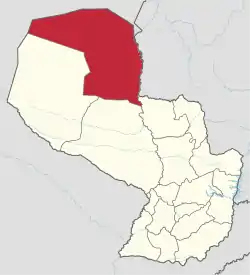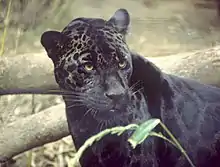Alto Paraguay | |
|---|---|
 Flag | |
 | |
| Coordinates: 20°30′S 59°0′W / 20.500°S 59.000°W | |
| Country | |
| Capital | Fuerte Olimpo |
| Government | |
| • Governor | Arturo Méndez (ANR) |
| Area | |
| • Total | 82,349 km2 (31,795 sq mi) |
| Population (2002) | |
| • Total | 15,008 |
| • Density | 0.18/km2 (0.47/sq mi) |
| Time zone | UTC-04 (AST) |
| • Summer (DST) | UTC-03 (ADT) |
| ISO 3166 code | PY-16 |
| Number of Districts | 2 |
Alto Paraguay (Spanish pronunciation: [ˈalto paɾaˈɣwaj]; Upper Paraguay) is the least populous as well as a sparsely populated department of Paraguay. The capital is the town of Fuerte Olimpo.
In 1992, the Chaco Department was merged with Alto Paraguay.
Nature and national parks

Alto Paraguay contains many natural resources, so is home to several national parks, each with different characteristics. The Defensores del Chaco National Park is the largest in the Paraguayan territory and holds the hill Cerro León, the highest point in northern Paraguay. The dry terrain optimally grows various species of cactus. Parque Nacional Río Negro is an area with several small lakes and most of the department's fauna. In the dry regions are Parque Nacional Coronel Cabrera and Parque Nacional Chovoreca.
Agriculture, livestock and deforestation


Paraguay's largest reserves of undeveloped fertile forest and lowest land prices are found in Alto Paraguay. Agriculture and cattle farming have started to make inroads. The fertility of the Chaco's deep sedimentary soils is generally high, except in the westernmost parts, where there are very sandy soils, and in the eastern plain where there are some seasonal wetlands. Annual rainfall is sufficient in the east (around 1200mm), fair in the center (around 900mm) and scarce in the west (around 700mm). A lack of infrastructure and roads is the primary limitation for farmers in the area.
Current agricultural expansion comes at the expense of the area's native forests. During the two decades between 1990 and 2010, Paraguay had one of the highest deforestation rates worldwide. The World Land Trust estimated 2008 deforestation in the Paraguay Chaco was over 200,000 hectares. [1]
The department's most important activity is cattle ranching, extensive in the savannas of the east and intensive on the planted pastures of cleared land. Cultivation of sorghum, sugar cane and (in planning stage as of January 2009, for the arid west) jatropha are very recent developments.
Districts
The department is divided into five districts:[2]
See also
References
- ↑ "Deforestation in Paraguay: Over 1500 football pitches lost a day in the Chaco". World Land Trust. 30 November 2009. Archived from the original on 2010-08-23. Retrieved 2010-01-14.
- ↑ Dirección General de Estadística, Encuestas y Censos : Censo : Lista de Áreas de Variables de Personas Retrieved 5 March 2010